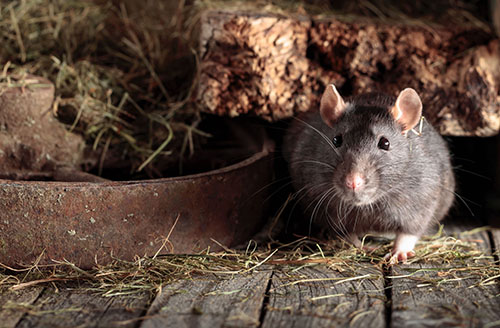Show Rodents the Door
Sep 12, 2022

As colder weather approaches, rodents will be looking for a warm place to find food and build a nest. Unfortunately, for many farmers, that refuge will be their barn or shed.
Mice can create a number of problems around the farm. Whether it be gnawing through wires, feed bags, and horse blankets or nesting in farm equipment, mice have the uncanny ability to cause damage that leads to expensive repairs.
To keep your barn safe and your animals healthy, it’s important to show rodents the door. Follow the simple suggestions below to keep your rodent population under control this fall:
Eliminate the food supply
If you store bagged livestock feed in your barn, you are offering mice a daily feast. Instead, store feed in sealed containers, such as metal garbage cans, either by pouring the bag of feed into the can or simply setting the whole bag inside. Also, if feed spills on the ground, make sure to sweep it up to completely eliminate rodents’ food supply and discourage them from entering your barn.
Strategize placement
Don’t wait for mice to come into your barn before you trap them. Place bait stations on the outside of your barn every 20-feet or so and lay traps around small gaps or pipes that rodents could enter through. Don’t place bait or traps where other animals, such as dogs, could consume it or where a child could tamper with it.
Use fresh bait
Bait on a monthly basis and be consistent. If bait isn’t fresh, rodents will move on to other readily available food sources in your barn, such as your grain supply. Also, as you apply bait and set traps, wear gloves to keep your scent from contaminating it. Rodents have an extremely good sense of smell and will be easily deterred from the bait station if they realize humans were recently in the area.
Cut the grass
Mowing and weed eating is for more than just aesthetics — it eliminates rodents’ protection from predators. If mice do not feel safe around your barn, they are less likely to hang around. Regularly mow the grass outside your barn and trim back any overgrown bushes that mice could be using as shelter.
Maintain buildings
Barns and other buildings will settle over time and create gaps, especially under doors and roofs. Repair and seal any openings where mice can enter. Mice can get through a nickel-sized hole, and rats can get through a quarter-sized hole, so routine maintenance is critical to preventing an infestation.
Fall doesn’t have to equal mice problems. Your local Co-op has numerous options for baiting and trapping rodents, so find the nearest store location here.
For more content like this, check out the latest issue of The Cooperator
Mice can create a number of problems around the farm. Whether it be gnawing through wires, feed bags, and horse blankets or nesting in farm equipment, mice have the uncanny ability to cause damage that leads to expensive repairs.
To keep your barn safe and your animals healthy, it’s important to show rodents the door. Follow the simple suggestions below to keep your rodent population under control this fall:
Eliminate the food supply
If you store bagged livestock feed in your barn, you are offering mice a daily feast. Instead, store feed in sealed containers, such as metal garbage cans, either by pouring the bag of feed into the can or simply setting the whole bag inside. Also, if feed spills on the ground, make sure to sweep it up to completely eliminate rodents’ food supply and discourage them from entering your barn.
Strategize placement
Don’t wait for mice to come into your barn before you trap them. Place bait stations on the outside of your barn every 20-feet or so and lay traps around small gaps or pipes that rodents could enter through. Don’t place bait or traps where other animals, such as dogs, could consume it or where a child could tamper with it.
Use fresh bait
Bait on a monthly basis and be consistent. If bait isn’t fresh, rodents will move on to other readily available food sources in your barn, such as your grain supply. Also, as you apply bait and set traps, wear gloves to keep your scent from contaminating it. Rodents have an extremely good sense of smell and will be easily deterred from the bait station if they realize humans were recently in the area.
Cut the grass
Mowing and weed eating is for more than just aesthetics — it eliminates rodents’ protection from predators. If mice do not feel safe around your barn, they are less likely to hang around. Regularly mow the grass outside your barn and trim back any overgrown bushes that mice could be using as shelter.
Maintain buildings
Barns and other buildings will settle over time and create gaps, especially under doors and roofs. Repair and seal any openings where mice can enter. Mice can get through a nickel-sized hole, and rats can get through a quarter-sized hole, so routine maintenance is critical to preventing an infestation.
Fall doesn’t have to equal mice problems. Your local Co-op has numerous options for baiting and trapping rodents, so find the nearest store location here.
For more content like this, check out the latest issue of The Cooperator